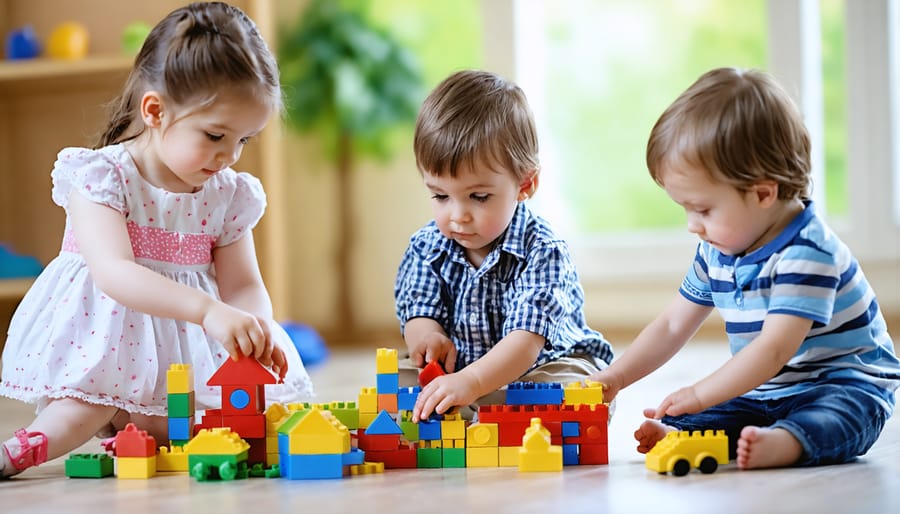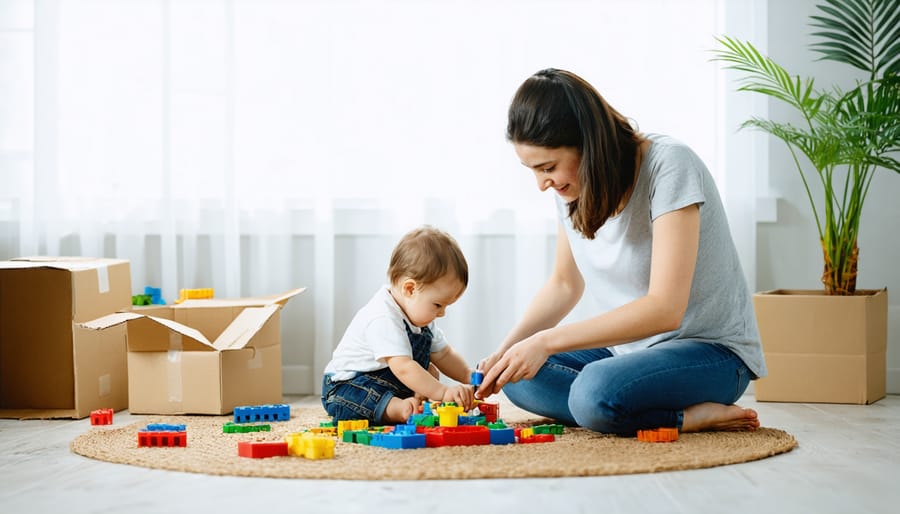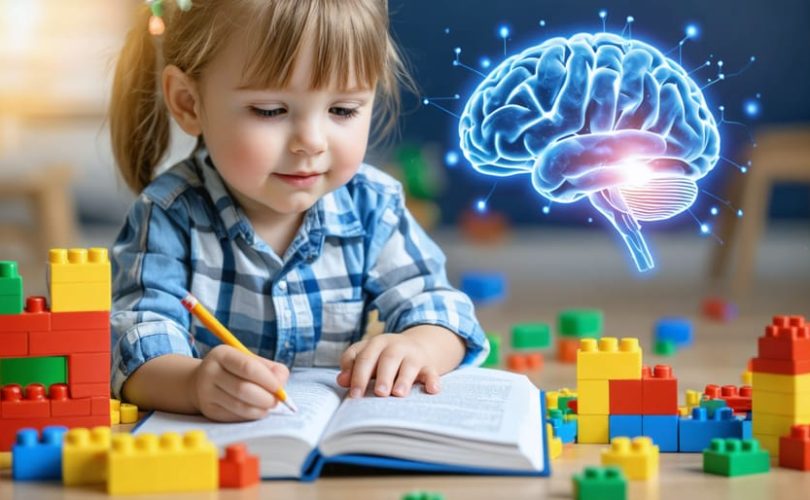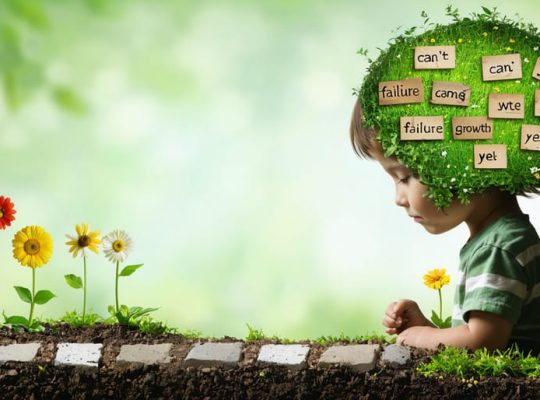Embrace the power of play in early childhood! Play-based learning is not just fun – it’s crucial for fostering cognitive, social, and emotional development in young children. Through hands-on exploration, imaginative play, and joyful interactions with caregivers and peers, children gain essential skills that lay the foundation for lifelong learning. Research shows that play enhances problem-solving abilities, creativity, language development, self-regulation, and social competence. By providing rich, engaging play experiences and nurturing warm, responsive relationships, parents and educators can support children’s healthy growth and set them up for success in school and beyond. Play is truly a child’s most important work – so let’s prioritize it and give every child the gift of a playful childhood.

How Play Shapes Brain Development
The Power of Sensory Play
Sensory play is a powerful tool for supporting early childhood development. Through hands-on exploration with diverse materials, textures, sounds, and sensations, babies and young children engage their senses to make sense of the world around them. These sensory-rich experiences are essential for refining perception, as little ones learn to distinguish between different visual, auditory, and tactile stimuli.
Mastering fine and gross motor skills is another key benefit of sensory play. Whether it’s squishing playdough, stacking blocks, or splashing in water, these playful infant activities help strengthen muscles, improve coordination, and develop dexterity. As children manipulate objects and experiment with cause and effect, they also lay the foundation for critical thinking and problem-solving abilities.
Moreover, sensory play often sparks wonder, curiosity, and pure delight – all of which are invaluable for nurturing a lifelong love of learning. By providing a safe, supportive environment for sensory exploration, parents and caregivers can foster their little ones’ cognitive, physical, and emotional growth in the most natural and joyful way possible. So go ahead and embrace the mess – your child’s developing brain will thank you!
Nurturing Creativity and Imagination
Play, especially pretend play, is a powerful tool for nurturing creativity and imagination in young children. When children engage in pretend play, they step into different roles, create stories, and explore novel ideas. This type of play encourages divergent thinking, allowing children to come up with multiple solutions and possibilities rather than just one “right” answer. As they act out various scenarios, children also develop their language skills by engaging in dialogue, negotiating roles, and expressing their thoughts and feelings. Pretend play provides a safe space for children to explore emotions, practice empathy, and learn to regulate their feelings. By putting themselves in someone else’s shoes, children develop a deeper understanding of others’ perspectives and emotions. This emotional intelligence lays the foundation for strong social skills and healthy relationships later in life. Parents and caregivers can support pretend play by providing open-ended props, such as boxes, fabrics, and everyday objects, and encouraging children to use their imagination. By valuing and facilitating pretend play, we give children the freedom to be creative, express themselves, and make sense of the world around them.
Play as a Vehicle for Social-Emotional Learning

Navigating Relationships through Play
Play is essential for helping young children learn social skills and navigate relationships. Through cooperative games and imaginative scenarios, kids practice sharing, taking turns, and compromising. They learn to read social cues, express their emotions, and respond empathetically to others. Play also provides a safe space to work through conflicts, such as disagreements over toys or rules. With adult guidance, children can develop problem-solving strategies and discover the value of open communication, active listening, and finding win-win solutions.
Moreover, play is the primary way young children build friendships. Engaging in activities they enjoy together, whether it’s building block towers, playing dress-up, or inventing new games on the playground, creates a sense of connection and shared joy. Playful interactions help kids appreciate what they have in common and celebrate what makes each person unique. Through play, children discover the foundations of positive relationships: mutual respect, trust, and kindness.
By prioritizing play-based learning, parents and early childhood educators give kids the tools to form strong social bonds and handle interpersonal challenges. These early experiences of successfully navigating relationships through play set the stage for a lifetime of emotional intelligence and meaningful connections with others.
The Adult’s Role in Play-Based Learning
Following the Child’s Lead
Following a child’s lead during play allows them to explore, discover, and learn at their own pace. When children direct their own play, they practice decision-making, problem-solving, and creative thinking. This type of self-directed learning is crucial for developing independence, self-confidence, and a love for learning.
As parents and caregivers, our role is to provide a safe, enriching environment that encourages exploration and supports the child’s natural curiosity. This means offering age-appropriate toys, materials, and experiences that spark their imagination and promote learning through play.
While it’s important to be present and engaged, avoid the temptation to over-direct or control the child’s play. Instead, observe their interests, ask open-ended questions, and offer gentle guidance when needed. This approach allows children to take the lead, make their own discoveries, and learn from their mistakes.
Remember, play is a child’s work. By trusting and empowering them to navigate their own play experiences, we foster their innate desire to learn, grow, and make sense of the world around them. When we follow the child’s lead, we celebrate their unique talents, nurture their passions, and help them develop the skills they need to thrive.
Providing Open-Ended Materials
When it comes to playtime, sometimes the simplest toys are the best. Open-ended materials like blocks, play silks, and art supplies encourage children to use their imaginations and develop their own ideas. These versatile playthings can be used in countless ways, allowing for endless creative possibilities.
Unlike electronic toys that have limited uses, open-ended toys grow with your child. Younger kids may simply explore the textures and colors, while older children can use the same materials for therapeutic play, storytelling, and problem-solving. Wooden blocks might become a castle one day and a race track the next.
In addition to fostering creativity, open-ended play helps develop important skills. Manipulating objects builds fine motor coordination. Constructing and experimenting teaches early STEM concepts. Cooperative play with peers promotes social skills like communication, sharing, and conflict resolution.
So next time you’re shopping for toys, consider the classic, multipurpose favorites that have inspired generations. A few well-chosen, high-quality playthings can provide far more enrichment than a room full of single-purpose gadgets. Invest in toys that will encourage your child’s unique interests and abilities to flourish through hands-on learning.

Play is the language of childhood – the most natural and impactful way young children learn about themselves, others, and the world around them. Through play, children develop critical cognitive, social, emotional, and physical skills that lay the foundation for lifelong learning and wellbeing. As parents, educators, and caregivers, it’s our responsibility to prioritize and protect this precious playtime. By providing ample opportunities for unstructured, child-led play both at home and in educational settings, we give children the space to explore, imagine, problem-solve, and discover at their own pace. Whether it’s building with blocks, engaging in pretend play, or running around outside, each playful experience contributes to their overall development.
So let’s commit to safeguarding playtime and creating environments that foster curiosity, creativity, and joy. Encourage children’s natural playfulness, follow their lead, and join in when invited. Remember, play is not a luxury but an essential part of childhood. By valuing play-based learning, we set children up for success not just in school but in life. Let’s give them the gift of a playful childhood – one filled with laughter, wonder, and endless opportunities to learn and grow.







